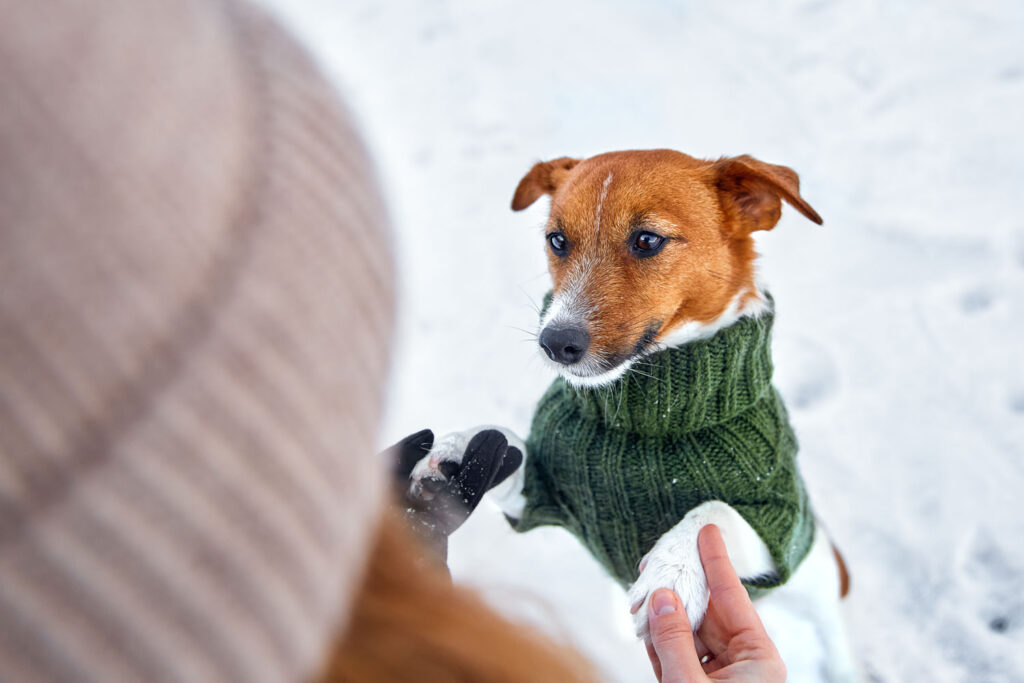January 31, 2025
Pet Safety During Winter and Protection Against Bird Flu
The information in this article may be outdated as it is more than 11 months old.

It’s cold out there, and pets are great for raising spirits and snuggling when the winter blues strike. The Cambridge Public Health Department wants to provide some tips for keeping our animal friends safe!
Tips for Outdoor Winter Safety
- Avoid keeping pets outside for long periods of time in this frigid cold. Skin on areas like the nose, ears, and paw pads can get frostbitten or lead to hypothermia after prolonged periods of exposure (the lower the temperature, the shorter time required for these conditions).
- Small or short-haired dogs may benefit from wearing a sweater or jacket when going outside or going for walks.
- Cats should be kept indoors during this time of year, even if they are used to going outside and roaming during other seasons of the year, as the temperatures are often too cold for them. See below for information on bird flu and outdoor cats.
- Salt and ice melt used to treat roads and walkways can harm their feet and can also be toxic. Make sure to wipe down their paws and bellies after walks to avoid ingestion from licking. Consider using booties or a paw protectant balm on paw pads before taking dogs out for walks to provide a barrier for the paw pads against the chemicals. Also, consider using pet-safe de-icers on your driveway or walkway.
- For hens: Ensure a heated space is available for roosting up off of the ground. The water supply should be heated and/or agitated to prevent freezing and check food and water supplies frequently to ensure accessibility.
- The City of Cambridge Animal Commission Page has several resources available for information about veterinary care, reporting lost and found pets, information for what to do if you find a cat, avoiding wild turkey and coyote encounters, and more.
Tips for Preventing Avian Influenza (Bird Flu) in Pets
- The status of the Highly Pathogenic Avian Influenza (HPAI) outbreak in animals, caused by an H5N1 flu virus, is being closely monitored by state environmental and health officials. The virus, also known as bird flu, is currently affecting geese and other wildlife, so pets should be kept away from birds and other wildlife.
- Domestic cats that go outside can present a risk to wild bird populations due to their hunting behavior, and thus may be at an increased risk of exposure to H5N1 or other diseases. When the weather is warmer, consider supervising outdoor time if you do let them out to keep them away from birds and other animals.
- Avoid feeding food marketed as “raw” or raw milk. The processes of cooking and pasteurization destroy the flu virus and other pathogens, like Salmonella, that could make pets sick.
- Cats in particular are very susceptible to severe illness from H5N1. Consumption of raw food or milk has been associated with causing illness in domestic cats.
- Besides the risk to pets, people can also get sick from pathogens in raw pet food if their pet becomes sick or from cleaning up pet feces, which can contain dangerous organisms (even if your pet doesn’t get sick).
- Wet food does not equal raw! Many commercially available brands of pet food that are cooked and nutritionally complete are sold as wet food in a can or pouch and are perfectly safe options to provide your furry companions.
- For henkeepers: Hens should be contained such that contact with birds and other wildlife is limited. Sick or dead poultry can be reported to Massachusetts Department of Agriculture Resources’ Division of Animal Health at (617) 626-1795.
- Henkeepers can also view the health department’s page on Bird Flu Guidance for Henkeepers for more information and resources.
- Henkeepers can also view the health department’s page on Bird Flu Guidance for Henkeepers for more information and resources.
- Sick or dead wild birds can be reported using this form. Do not handle any sick or dead birds yourself!
